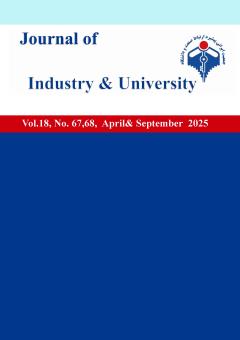The Ratio of Social Convergence and Development: A Case Study of Hormozgan Province
Subject Areas : Special
Parviz Salari Sardari
1
![]() ,
Abazar Ashtari Mehrjardi
2
,
Abazar Ashtari Mehrjardi
2
![]() ,
Akbar Ashrafi
3
,
Akbar Ashrafi
3
1 - PhD candidate in Sociology (Political Sociology), Islamic Azad University, Science and Research Branch Tehran, Iran
2 - Assistant Professor, Department of Social Studies of Science and Technology, Institute for Cultural and Social Studies, Tehran, Iran
3 - Assistant Professor, Department of Political Science, Islamic Azad University, Central Tehran Branch, Tehran, Iran
Keywords: Development, Social Integration, Ethnic and Religious Divergence, Ethnic and Religious Convergence,
Abstract :
Today, the issue of modernity and the weakening of the symbolic unity created by monarchies, religion, a sense of belonging to the country, and other factors have caused social integration to become a social and cultural issue at both the micro and macro levels, and ultimately a factor that drives and inhibits development. This article attempts to provide a general overview of this field by presenting quantitative evidence and integrating research findings. Accordingly, our most important goal in this article is to qualitatively examine the relationship between social cohesion and development in Hormozgan province.
In this article, using thematic analysis, we want to show how by reducing existing divergences and strengthening social cohesion, it will be possible to overcome the status quo and achieve development. Accordingly, our most important findings in two sections are the components and importance of social cohesion in development. Including 9 items: relying on common points and avoiding marginalization - recognizing all ethnicities and religions and fair distribution of services and facilities - forward-looking and the level of honesty and urban culture - the desire to maintain peace in individual and social life - solidarity and social capital - continuing respect for religions from ancient times - coexistence and convergence of ethnicities and religions - public trust - warm-hearted people of the province) And analysis of developmental factors and trust-building in social integration (including 10 cases of not being isolated from political and cultural relations - having ethnic groups share in government services - distributing facilities without considering tasteful behavior - distributing positions based on merit and competence - resolving the socio-economic gap between natives and non-natives - Development of infrastructure and livelihood facilities - attention to health justice - medical services in the region - balanced development based on collective interests - solving multilateral deprivations - creating trust between the people and the government and resolving pessimism) are presented
1. احمدی، سیدعباس و جعفری، سامان،1394،بررسی زمینه های همگرایی و واگرایی در میان اقوام ایرانی،هشتمین کنگره انجمن ژئوپلیتیک ایران همدلی اقوام ایرانی انسجام و اقتدار ملی،سنندج،
2. اشتری مهرجردی، اباذر. تبیین عوامل اجتماعی اخلاق کار (مورد مطالعه: اعضای هیات علمی دانشگاههای شهر تهران)، نشریه صنعت و دانشگاه. شماره 55-56، (1401).
3. اشتری مهرجردی، اباذر، سالاری، پرویز، اشرفی، پرویز. (1402) صورتبندی مطالعات همگرایی اجتماعی طی سه دهه گذشته، نشریه صنعت و دانشگاه. شماره 59، .
4. امینی زاده، سینا، بوستانی، داریوش. (1395). همگرایی و واگرایی هویتهای ملی، مذهبی و جهانی (مطالعه موردی: دانشجویان دانشگاه شهید باهنر کرمان). توسعه اجتماعی، 10(3)، 111-138. (1395).
5. بارسلطان، سيده رويا، (1394)، بررسي عوامل مؤثر بر همگرايي قوميتها با تأکيد بر ساختار امنيت کشور ايران، علوم و فنون رزمي، دوره 4، شماره 13
6. باصری، احمد، عباسیان، شیرزاد، کریمی، بهروز. (1396). رابطه بین سرمایه اجتماعی و همگرایی قومیتی در استان آذربایجان غربی. فصلنامه مدیریت بحران و وضعیت های اضطراری. 9(34). 115-141. (1396).
7. برزگر، نصرت، لطفی، حیدر، حسن آبادی، داود، رضویان، محمد تقی(1398). نقش سیاستهای قومی و مذهبی در مشارکت اقوام در امنیت، توسعه همه جانبه و همگرایی با تأکید بر ترکمنهای شمال و شمال شرق ایران. فصلنامه جغرافیا (برنامه ریزی منطقه ای).9(34).433-455..
8. بيرو، آلن( 1375 )، "فرهنگ علوم اجتماعي"، ترجمه: باقر ساروخاني، تهران: انتشارات كيهان.
9. پورجلالي، محمدرضا، (1395)، نقش توسعه سياسي در همگرايي و واگرايي قومي در ايران (مطالعه موردي: عرب هاي استان خوزستان)، كنگره بين الملي عوم اسلامي و علوم انساني
10. نوذری، حسین علی.1376. ضرورت همگرایی جامعه شناسی و تاریخ؛ نگاهی به رابطه نظریه اجتماعی و تاریخ. نشریه تاریخ معاصر ایران، تابستان 1376 – شماره2. ص122-93.


